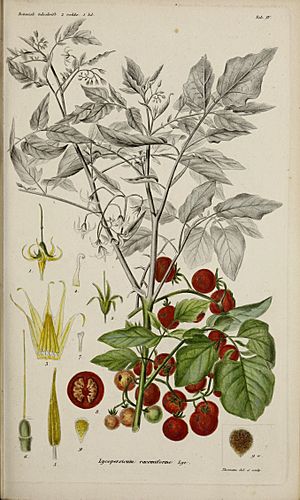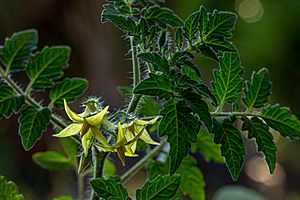Currant tomato facts for kids
Quick facts for kids Currant tomato |
|
|---|---|
 |
|
| Scientific classification |
|
| Kingdom: | Plantae |
| Clade: | Tracheophytes |
| Clade: | Angiosperms |
| Clade: | Eudicots |
| Clade: | Asterids |
| Order: | Solanales |
| Family: | Solanaceae |
| Genus: | Solanum |
| Species: |
S. pimpinellifolium
|
| Binomial name | |
| Solanum pimpinellifolium L., 1755
|
|
| Script error: The function "autoWithCaption" does not exist. | |
| Synonyms | |
|
Lycopersicon pimpinellifolium (L.) Mill. |
|
Script error: No such module "Check for conflicting parameters".
The currant tomato (scientific name: Solanum pimpinellifolium) is a wild type of tomato. It originally comes from countries like Ecuador and Peru. You can also find it growing naturally in other places, such as the Galápagos Islands. Its small fruits are safe to eat. Many people grow it in their gardens as an old-fashioned, or "heirloom," plant. Even though it's grown in gardens, it's still considered a wild plant. It's different from the common tomato we usually eat, which is called Solanum lycopersicum. Scientists studied its entire genetic code, or genome, in 2012.
Contents
Why Currant Tomatoes Are Important
Currant tomatoes are very important for growing new and better types of tomatoes. They can easily mix with common garden tomatoes. This means they can create new kinds of tomatoes that have helpful traits.
Helping Tomatoes Fight Diseases
Scientists use Solanum pimpinellifolium to make regular tomatoes stronger. For example, they can introduce genes from the currant tomato that help common tomatoes resist diseases. This is a big help for farmers and gardeners.
Making Tomatoes Healthier
Currant tomatoes also have more good things inside them than regular tomatoes. They contain higher amounts of lycopene, which is a healthy red pigment. They also have more vitamin C and special plant chemicals called phenolic acids. This means they have a stronger ability to fight harmful things in the body, which is called antioxidant capacity.
Understanding Tomato Genetics
Scientists also study currant tomatoes to learn more about how tomato traits are controlled by genes. This includes things like the shape and size of the fruit. The genetic code of the currant tomato is very similar to the common tomato. They only differ by a tiny amount, about 0.6% of their genetic building blocks. To compare, both are much more different from the potato, which they separated from about 7.3 million years ago.
Protecting Tomato Diversity
Many experts believe the currant tomato is the ancestor of all domesticated tomatoes. It's very valuable because it adds to the limited variety of genes in common tomatoes. Think of it like a backup library of useful traits. However, because of farming and development, wild currant tomatoes are becoming less common in their natural homes in northern Peru and southern Ecuador. Also, collecting their seeds can be tricky due to international rules like the Convention on Biological Diversity.
See also
 In Spanish: Tomate pasa para niños
In Spanish: Tomate pasa para niños
 | Precious Adams |
 | Lauren Anderson |
 | Janet Collins |


